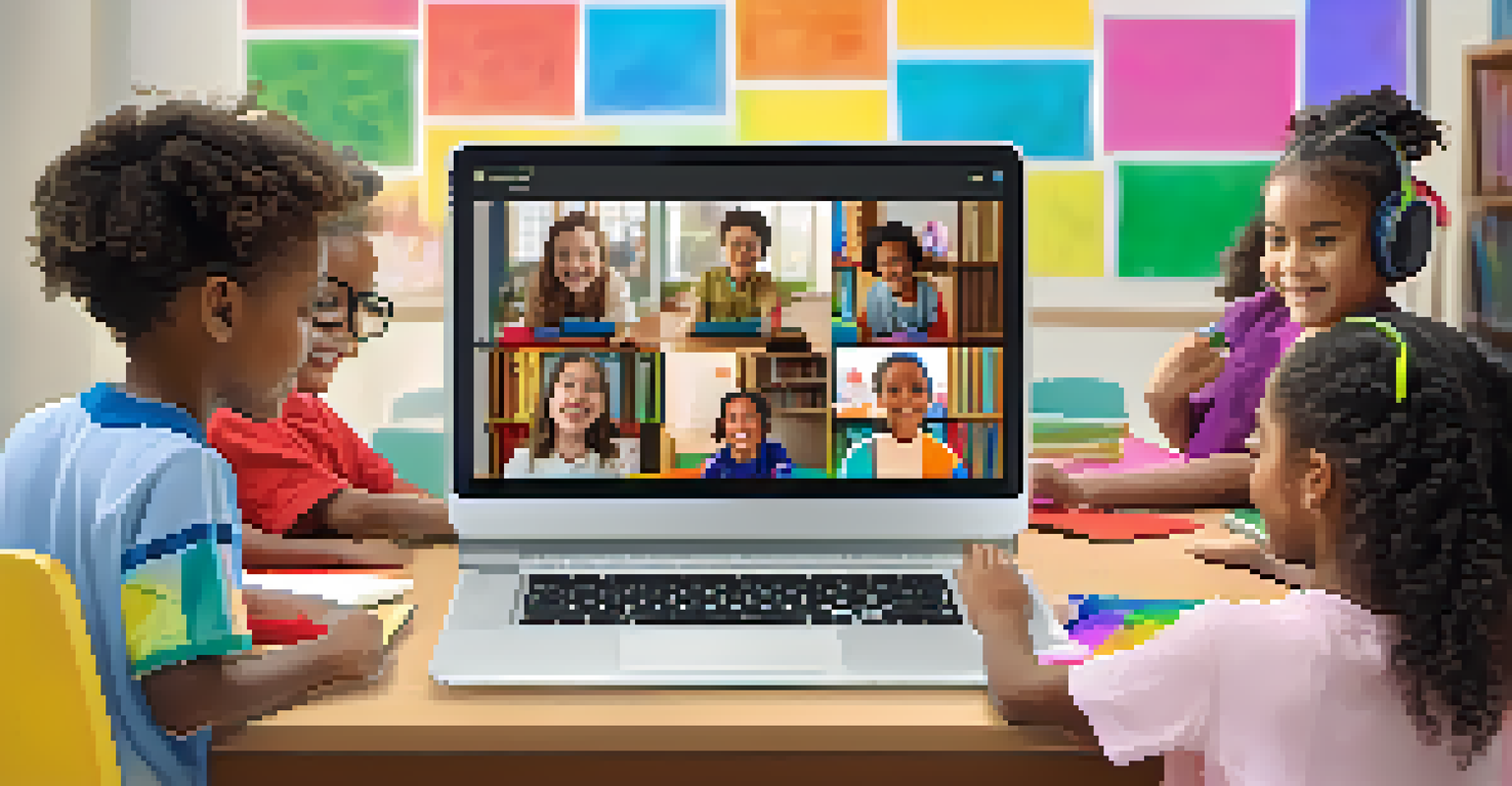The Role of Parental Involvement in Online Education

Importance of Parental Support in Online Learning
Parental support plays a crucial role in a child’s online learning journey. When parents actively engage, they can help motivate and encourage their children, making the learning process smoother. For instance, a simple check-in about homework can boost a child's confidence and accountability.
Parental involvement is the key to a child's success in school, whether it be in person or online.
Moreover, parents who understand the curriculum can better assist their children with assignments and projects. This involvement not only helps children grasp complex concepts but also fosters a love for learning. When kids see their parents interested in their education, they're more likely to value it themselves.
Ultimately, parental support creates a collaborative learning environment. This partnership between parents and children can lead to improved academic performance and a more positive attitude toward education in general.
Setting a Structured Learning Environment at Home
Creating a structured learning environment is essential for online education. Parents can designate a specific area in the home that is free from distractions, promoting focus and productivity. This could be a quiet corner of a room or even a designated 'study zone' that signals to kids it's time to learn.

Additionally, establishing a daily routine can help children manage their time effectively. Parents can assist in setting a schedule that includes breaks, study sessions, and time for extracurricular activities. This balance is vital, as it helps children develop self-discipline and time management skills.
Parental Support Boosts Learning
Active parental involvement enhances children's motivation and fosters a love for learning.
With a structured environment, children are more likely to stay on task and engage with their online lessons. It also reinforces the idea that education is a priority, which can lead to better learning outcomes.
Communication Between Parents and Educators
Open communication between parents and educators is key to maximizing a child's online education. Parents should feel empowered to reach out to teachers for updates, concerns, or feedback regarding their child’s progress. This dialogue fosters a supportive network around the student.
Education is not the filling of a pail, but the lighting of a fire.
Regular check-ins with educators can provide valuable insights into the curriculum and expectations. Being informed allows parents to better support their children with relevant resources or activities at home. For example, if a teacher suggests additional reading materials, parents can incorporate those into their home learning.
Establishing this communication channel not only benefits the child but also strengthens the partnership between home and school. It creates a unified approach to education, ensuring everyone is on the same page.
Encouraging Independence and Self-Directed Learning
While parental involvement is crucial, it's equally important to encourage independence in online learners. Parents can guide their children in setting personal goals and taking ownership of their education. This balance helps children develop confidence and self-motivation.
For instance, parents can start by allowing children to choose which subjects they want to explore more deeply. Encouraging them to research topics of interest fosters curiosity and a love for learning. This approach can lead to more meaningful educational experiences.
Structured Environments Enhance Focus
Designating study spaces and routines helps children manage their time and stay engaged in online lessons.
By promoting self-directed learning, parents help children develop critical thinking skills and problem-solving abilities. These skills are invaluable in both academic and real-world scenarios, preparing them for future challenges.
Using Technology to Enhance Engagement
In our tech-savvy world, parents can leverage technology to enhance their children’s online education. There are numerous educational apps and platforms available that make learning interactive and fun. Parents can explore these tools together with their kids to find what resonates best.
For example, gamified learning apps can turn challenging subjects into exciting challenges. This not only makes learning enjoyable but also encourages children to engage more deeply with the material. Parents can track their child’s progress through these platforms, providing encouragement along the way.
Embracing technology as a supportive tool can transform the online learning experience. It allows for creativity and innovation, making education more relevant and accessible.
Promoting Social Interaction in Online Learning
One challenge of online education is the potential for social isolation. Parents can play a pivotal role in promoting social interaction among their children, even in a virtual setting. Arranging virtual study groups or encouraging participation in online forums can foster connections with peers.
For instance, parents might facilitate online playdates or collaborative projects with friends. This not only helps children bond with their peers but also allows them to learn from one another. Social interaction is vital for developing communication skills and emotional intelligence.
Encouraging Independence is Key
Promoting self-directed learning helps children develop critical thinking and problem-solving skills.
By encouraging these interactions, parents help their children build a sense of community and teamwork, essential skills in today’s collaborative world.
Monitoring Progress and Celebrating Achievements
Finally, parents should actively monitor their child's progress in online education. Regularly checking assignments, grades, and participation can help identify areas where the child might need additional support. This proactive approach ensures that any challenges are addressed promptly.
Moreover, celebrating achievements—big or small—can boost a child’s motivation and self-esteem. A simple acknowledgment of completing a tough assignment or mastering a new skill can go a long way. Parents can create a reward system to encourage ongoing effort and progress.

By staying involved and recognizing accomplishments, parents reinforce their child’s commitment to learning. This creates a positive feedback loop that encourages continued growth and success.